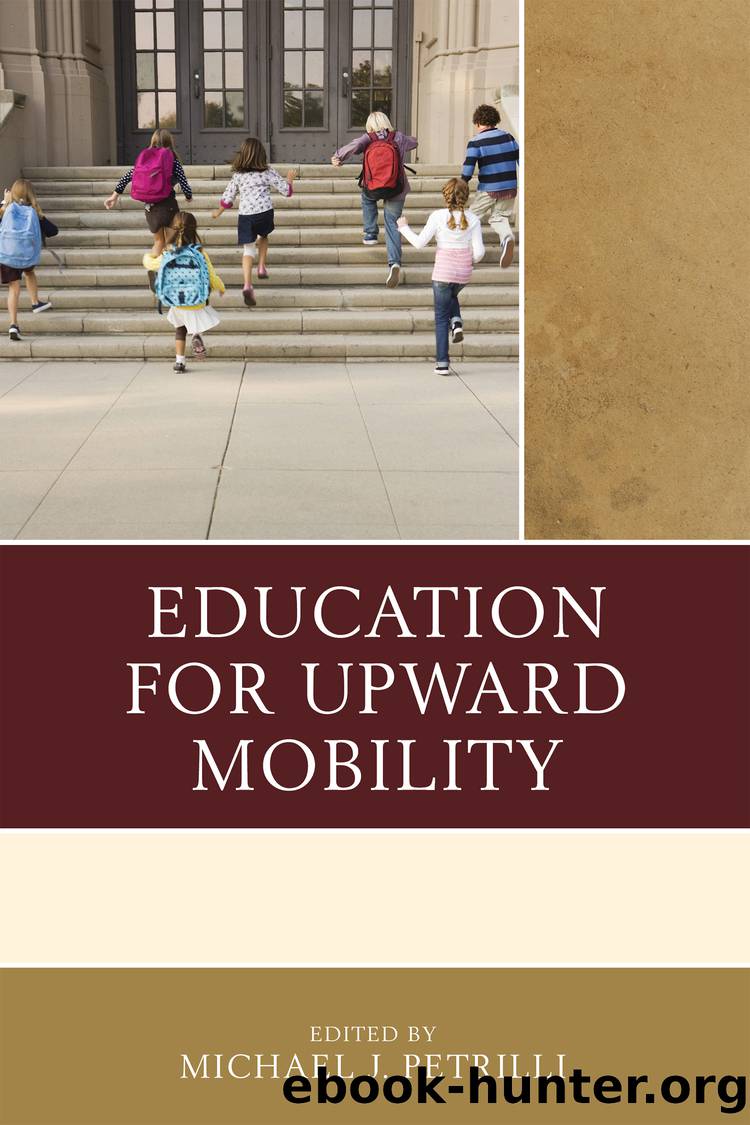Education for Upward Mobility by Petrilli Michael J.;

Author:Petrilli, Michael J.; [Petrilli, Michael J.]
Language: eng
Format: epub
Publisher: Rowman & Littlefield Publishers
Published: 2015-08-15T00:00:00+00:00
Downtown College Prep: To and Through
Berenice Cervantesâs parentsâDad has a third-grade education, Mom made it to fifth gradeâleft their small town in Mexico when their daughter was a baby. The town had an elementary school, but no middle school or high school. They wanted better opportunities for their kids.
They picked crops in Californiaâs Central Valley and then they found work in San Jose, California. Her father was a driver, her mother a janitor. âI saw their sacrifice, how hard they worked,â recalls Cervantes. âI had to excel to pay them back. My grades were my paychecks to them.â A Mount Holyoke graduate, Cervantes is college access and success coordinator for Summer Search, a nonprofit that provides mentoring, summer enrichment experiences, and counseling to disadvantaged students from tenth grade through college.
McKinley âMacâ Dickerson spent several years in a homeless shelter when he was in elementary school. In middle school, his emotional issues led to a special-education diagnosis. As an agent and trainer for Transamerica, Dickerson helps families plan their finances, including how to save money for college. He earned an economics degree from University of California at Santa Cruz. His goal is to be âDCPâs first millionaire alumni,â he says.
Both are 2005 graduates of DCP, a scrappy charter school in San Jose. The cityâs first charter, it opened its doorsâthe doors of an old church and a former YWCA blocks apartâin 2000. Two young teachers, Greg Lippman and Jennifer Andaluz, targeted underachievers from Mexican immigrant families, kids who were âfailing but not in jail,â as Lippman put it. With a longer school day and a relentless focus on college prep, they believed their charter could put C, D, and F students on the college track.
In the early years, 85 percent of its students were Latino, and nearly all were from low-income and working-class families. Some came with special-ed labels: learning disabled, developmentally delayed, emotionally and behaviorally disordered. Others werenât fluent in English. Psychologist Carol Dweck hadnât yet popularized the importance of the âgrowth mindset,â the belief that hard work will lead to success. The Knowledge Is Power Program hadnât yet concluded that disadvantaged students need âgritâ to make it through college.
Downtown College Prep was all about grit, known as ganas, before it was fashionable. âWeâre not good now but we can get betterâ was the unofficial motto, as I wrote in my book, Our School, about DCPâs early years:
At DCP, low achievers arenât told theyâre doing well; theyâre told they can do better, if they work hard. The school doesnât boost self-esteem with empty praise. Instead Lippman and his teachers encourage whatâs known as âefficacious thinking,â the belief that what a person does has an effect. If you study, youâll do better on the test than if you goof off. Work hard in school, and you can get to college. You have control over your future. So, stop making excuses and start getting your act together.23
At one assembly, teachers acted out the fable of the tortoise and the hare. A math
Download
This site does not store any files on its server. We only index and link to content provided by other sites. Please contact the content providers to delete copyright contents if any and email us, we'll remove relevant links or contents immediately.
The Art of Coaching Workbook by Elena Aguilar(50168)
Trainspotting by Irvine Welsh(21078)
Twilight of the Idols With the Antichrist and Ecce Homo by Friedrich Nietzsche(18324)
Fangirl by Rainbow Rowell(8819)
Periodization Training for Sports by Tudor Bompa(7946)
Change Your Questions, Change Your Life by Marilee Adams(7405)
This Is How You Lose Her by Junot Diaz(6476)
Asking the Right Questions: A Guide to Critical Thinking by M. Neil Browne & Stuart M. Keeley(5388)
Grit by Angela Duckworth(5322)
Red Sparrow by Jason Matthews(5226)
Paper Towns by Green John(4826)
Room 212 by Kate Stewart(4767)
Ken Follett - World without end by Ken Follett(4467)
The Sports Rules Book by Human Kinetics(4098)
Housekeeping by Marilynne Robinson(4084)
Double Down (Diary of a Wimpy Kid Book 11) by Jeff Kinney(3959)
Papillon (English) by Henri Charrière(3942)
The Motorcycle Diaries by Ernesto Che Guevara(3804)
Exercise Technique Manual for Resistance Training by National Strength & Conditioning Association(3798)
